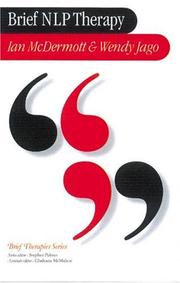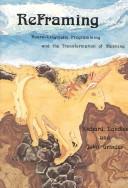| Listing 1 - 10 of 11 | << page >> |
Sort by
|
Book
ISBN: 1601383827 1601387911 Year: 2011 Publisher: Ocala : Atlantic Publishing Group,
Abstract | Keywords | Export | Availability | Bookmark
 Loading...
Loading...Choose an application
- Reference Manager
- EndNote
- RefWorks (Direct export to RefWorks)
When it first developed in the 1970s by Richard Bandler and John Grinder, Neuro-Linguistic Programming or NLP was considered a great advancement in psychotherapy and was widely studied as a means by which to subjectively study language, communication and personal change. Today, it is a highly successful means by which individuals such as yourself can not only get better in touch with yourself and how you interact with the world through language and other forms of communication, but to better understand those around you and make enhanced decisions through understanding. This book was written t
Acting. --- Neurolinguistic programming. --- Performing arts. --- Neurolinguistic programming --- Social Sciences --- Psychology --- Neuro-linguistic programming --- NLP (Psychology) --- Programming, Neuro-linguistic --- Programming, Neurolinguistic --- Change (Psychology) --- Psychotherapy
Book
ISBN: 9782875151292 Year: 2011 Publisher: Bruxelles Ixelles éditions
Abstract | Keywords | Export | Availability | Bookmark
 Loading...
Loading...Choose an application
- Reference Manager
- EndNote
- RefWorks (Direct export to RefWorks)
NLP --- NLP (Psychology) --- Neuro-Linguistisches Programmieren --- Neuro-linguistic programming --- Neurolinguistic programming --- Neurolinguïstisch programmeren --- Neurolinguïstische programmering --- PNL --- Programação neurolinguística --- Programmation neuro-linguistique --- Programmation neurolinguistique --- Programming [Neuro-linguistic ] --- Programming [Neurolinguistic ] --- Interpersonal communication --- Personality development --- Communication interpersonnelle --- Personnalité --- Développement --- Personnalité --- Développement

ISBN: 0916990087 9780916990084 Year: 1980 Publisher: Cupertino Meta publications
Abstract | Keywords | Export | Availability | Bookmark
 Loading...
Loading...Choose an application
- Reference Manager
- EndNote
- RefWorks (Direct export to RefWorks)
Psychotherapy --- Neurolinguistic programming --- Psychagogy --- Therapy (Psychotherapy) --- Mental illness --- Clinical sociology --- Mental health counseling --- Neuro-linguistic programming --- NLP (Psychology) --- Programming, Neuro-linguistic --- Programming, Neurolinguistic --- Change (Psychology) --- Treatment --- Neurolinguistic programming. --- Psychotherapy.

ISBN: 0566083892 0566089572 1315586126 9780566083891 1138275190 1317123972 9781315586120 9781317123972 9781317123958 9781138275195 1317123964 9780566089572 Year: 2016 Publisher: Abingdon
Abstract | Keywords | Export | Availability | Bookmark
 Loading...
Loading...Choose an application
- Reference Manager
- EndNote
- RefWorks (Direct export to RefWorks)
BUSINESS & ECONOMICS --- Business Communication / General --- Neurolinguistic programming --- Psychotherapy --- Computer Science --- Psychiatry --- Engineering & Applied Sciences --- Health & Biological Sciences --- Neuro-linguistic programming --- NLP (Psychology) --- Programming, Neuro-linguistic --- Programming, Neurolinguistic --- Change (Psychology) --- E-books

ISBN: 0911226222 0911226230 Year: 1981 Publisher: Real People Press
Abstract | Keywords | Export | Availability | Bookmark
 Loading...
Loading...Choose an application
- Reference Manager
- EndNote
- RefWorks (Direct export to RefWorks)
Hypnotism --- Neurolinguistic programming. --- Therapeutic use --- Problems, exercises, etc. --- Neurolinguistic programming --- Neuro-linguistic programming --- NLP (Psychology) --- Programming, Neuro-linguistic --- Programming, Neurolinguistic --- Change (Psychology) --- Psychotherapy --- Autosuggestion --- Braidism --- Hypnosis --- Trance --- Animal magnetism --- Mesmerism --- Therapeutic use&delete& --- Problems, exercises, etc
Book
ISBN: 1299471846 0857011367 9780857011367 9781848191617 1848191618 Year: 2013 Publisher: London Singing Dragon
Abstract | Keywords | Export | Availability | Bookmark
 Loading...
Loading...Choose an application
- Reference Manager
- EndNote
- RefWorks (Direct export to RefWorks)
Neuro-Linguistic Programming (NLP) teaches how to model excellence to achieve excellence in everything you do. This introductory guide explains the principles of NLP, showing how to be in tune with your patterns of behaviour and language and those of the people around you, and how to use this knowledge to reach your goals.
Neurolinguistic programming. --- Interpersonal relations. --- Human relations --- Interpersonal relationships --- Personal relations --- Relations, Interpersonal --- Relationships, Interpersonal --- Social behavior --- Social psychology --- Object relations (Psychoanalysis) --- Neuro-linguistic programming --- NLP (Psychology) --- Programming, Neuro-linguistic --- Programming, Neurolinguistic --- Change (Psychology) --- Psychotherapy

ISBN: 0761959653 9786610369638 1280369639 1412932882 9781412932882 9780761959656 9780761959663 0761959661 9781446218389 1446218384 9781280369636 0761959661 6610369631 Year: 2001 Publisher: London ; Thousand Oaks [Calif.] : Sage Publications,
Abstract | Keywords | Export | Availability | Bookmark
 Loading...
Loading...Choose an application
- Reference Manager
- EndNote
- RefWorks (Direct export to RefWorks)
Neuro-linguistic programming has evolved as an effective approach to therapeutic work that originated in the study of excellence in communication. Because of this NLP is of increasing interest to counsellors and psychotherapists.
Neurolinguistic programming. --- Psychotherapy. --- Psychagogy --- Therapy (Psychotherapy) --- Mental illness --- Clinical sociology --- Mental health counseling --- Neuro-linguistic programming --- NLP (Psychology) --- Programming, Neuro-linguistic --- Programming, Neurolinguistic --- Change (Psychology) --- Psychotherapy --- Treatment --- Brief psychotherapy. --- Brief therapy (Psychotherapy) --- Psychotherapy, Brief --- Short-term psychotherapy --- Time-limited psychotherapy

ISBN: 0911226257 Year: 1982 Publisher: Real People Press
Abstract | Keywords | Export | Availability | Bookmark
 Loading...
Loading...Choose an application
- Reference Manager
- EndNote
- RefWorks (Direct export to RefWorks)
Psychiatry --- Attitude change --- Meaning (Psychology) --- Negotiation --- Neurolinguistic programming --- Psychotherapy --- Psychagogy --- Therapy (Psychotherapy) --- Mental illness --- Clinical sociology --- Mental health counseling --- Neuro-linguistic programming --- NLP (Psychology) --- Programming, Neuro-linguistic --- Programming, Neurolinguistic --- Change (Psychology) --- Bargaining --- Dickering --- Haggling --- Higgling --- Negotiating --- Negotiations --- Discussion --- Psychology, Applied --- Psychology --- Change of attitude --- Attitude (Psychology) --- Judgment --- Social influence --- Treatment --- Attitude change. --- Meaning (Psychology). --- Negotiation. --- Neurolinguistic programming. --- Psychotherapy. --- Psycholinguistics

ISBN: 185604372X Year: 2000 Publisher: London Library association
Abstract | Keywords | Export | Availability | Bookmark
 Loading...
Loading...Choose an application
- Reference Manager
- EndNote
- RefWorks (Direct export to RefWorks)
Library management --- 024.001.85 --- Library employees --- -Library employees --- -Information science --- -Teaching --- -Neurolinguistic programming --- 020 --- Neuro-linguistic programming --- NLP (Psychology) --- Programming, Neuro-linguistic --- Programming, Neurolinguistic --- Change (Psychology) --- Psychotherapy --- Didactics --- Instruction --- Pedagogy --- School teaching --- Schoolteaching --- Education --- Instructional systems --- Pedagogical content knowledge --- Training --- Communication --- Information literacy --- Library science --- Libraries --- Library staff --- Library personnel --- Employees --- Gebruikersopleiding. Bibliotheekinstructie --- In-service training --- Training of --- User education --- Methods --- 024.001.85 Gebruikersopleiding. Bibliotheekinstructie
Book

ISBN: 9781847692412 9781847692429 1847692427 1847692419 1282657070 9781282657076 9786612657078 6612657073 184769389X Year: 2009 Publisher: Bristol Blue Ridge Summit
Abstract | Keywords | Export | Availability | Bookmark
 Loading...
Loading...Choose an application
- Reference Manager
- EndNote
- RefWorks (Direct export to RefWorks)
Neurolinguistic and Psycholinguistic Perspectives on SLA is a collection of twelve chapters, reporting on research results and presenting theoretical insights into the processes of language acquisition. It is divided into two major sections: the first part demonstrates the ways in which the latest developments in non-invasive techniques of brain monitoring allow researchers to test hypothesis related to biological foundations of language acquisition, including also accounts of emotional factors, limbic communication and evidence from language disorders. The second part offers psycholinguistic modelling of a number of components of second language competence, such as the acquisition of reading and writing, handling of foreign language vocabulary and the nature of bi- and multilingualism. It is a valuable collection for active researchers in the field, as well as for postgraduate students in language acquisition, psycholinguistics and neurolinguistics.
Neurolinguistics. --- Psycholinguistics. --- Second language acquisition. --- Language, Psychology of --- Language and languages --- Psychology of language --- Speech --- Linguistics --- Psychology --- Thought and thinking --- Second language learning --- Language acquisition --- Neuro-linguistics --- Biolinguistics --- Higher nervous activity --- Neuropsychology --- Psychological aspects --- Neurolinguistics --- Psycholinguistics --- Second language acquisition --- Neurolinguistic programming. --- Neuro-linguistic programming --- NLP (Psychology) --- Programming, Neuro-linguistic --- Programming, Neurolinguistic --- Change (Psychology) --- Psychotherapy --- Psychological aspects. --- Bilingualism . --- SLA. --- Second Language Acquisition. --- foreign language learning. --- foreign language vocabulary. --- multilingualism. --- neurolinguistics. --- psycholinguistics. --- second language competence. --- second language learning.
| Listing 1 - 10 of 11 | << page >> |
Sort by
|

 Search
Search Feedback
Feedback About UniCat
About UniCat  Help
Help News
News